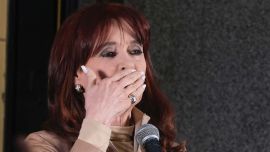Almost all children in Argentina living in poverty come from households where at least one adult works, undermining the government's claims of a strong jobs recovery.
In the first half of last year, nine out of 10 children living in "monetary poverty" in Argentina came from households where at least one person had a job, according to a new United Nations Children's Fund report released Wednesday in conjunction with local social organisations. UNICEF defines monetary poverty by household income and cost of living metrics.
Conditions have also worsened since the beginning of 2022. Annual inflation accelerated from 65 percent in June to almost 99 percent in January, meaning poverty levels this year will not decrease, according to UNICEF's Sebastian Waisgrais.
"Household incomes are lagging behind inflation," said Waisgrais, a specialist in social inclusion, at a press conference. "Barring a major rise in incomes or a sharp fall in inflation, poverty will remain at these persistently high levels."
s his party prepares for elections this year, President Alberto Fernández often refers to gains in labour figures during his term in office to criticise the opposition coalition that governed before him.
Fernández's spokeswoman, Gabriela Cerruti, did not respond to a request for comment on the UNICEF report.
While unemployment in Argentina has fallen since the pandemic to multi-year lows, many of the gains in payroll jobs are concentrated in low-wage sectors such as hospitality, while informal jobs, which are paid entirely in cash, have risen to record levels. At the end of September 2022, Argentina had about 10.8 million informal or non-wage jobs compared to 7.3 million payroll jobs in the private sector, according to the latest government data.
related news
by Patrick Gillespie, Bloomberg



















Comments